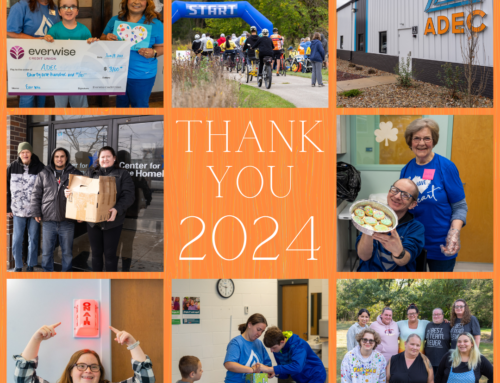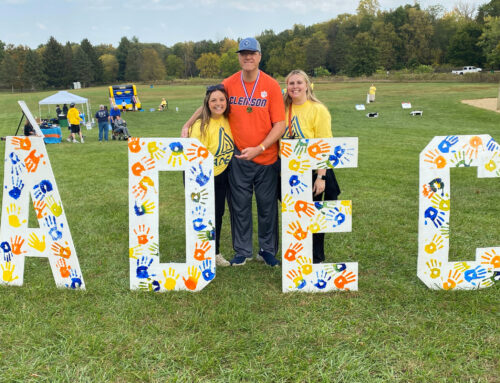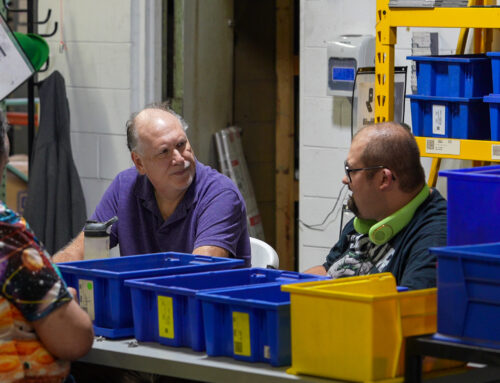[vc_row][vc_column][vc_column_text]As her three children sat on the floor of the living room browsing through old photographs, Tamilka Caston pondered a question that many parents of children with disabilities face: What comes after high school?
All three Caston children — Damion, 23; Anthony, 21; and Nicole, 18 — have graduated from high school and have hopes for the future, but they’re not quite sure how to get there.
Some young adults with disabilities choose to join the workforce right out of school while others choose to attend a day service to learn new vocations, like baking or sewing. But some young adults with disabilities find themselves in an awkward gap: they have graduated or “aged out” of the public school system, but they would still like to develop job readiness skills before pursuing their career.
ADEC’s new Growth and Purpose (GAP) program is designed to help bridge the gap between education and employment. The program, which launches in April, is open to any individuals with disabilities interested in joining the workforce, but is aimed at upcoming and recent high school graduates.[/vc_column_text][/vc_column][/vc_row][vc_row css=”.vc_custom_1522256412274{background-color: #ffffff !important;}”][vc_column width=”2/3″][vc_column_text]The Caston children are poised to be among GAP’s first class of students. Tamilka said she is hopeful that the program will help her children reach their goals by providing one-on-one job coaching while also incorporating social skills development and recreation.
“I’m not looking to just stick them someplace to get rid of them,” she said. “I’m trying to find a way for them to branch out and discover what they want to do in life.”
GAP will run from 8 a.m. to 3 p.m. Monday through Friday and students will learn all skills necessary to be successful in a job setting, from drafting a resume to negotiating a job offer. GAP will follow the structure of a classroom, with new topics introduced at the pace of each student in the program, and will be taught by ADEC instructors who will individually with students to set each one up for success.[/vc_column_text][/vc_column][vc_column width=”1/3″ css=”.vc_custom_1522256424592{background-color: #008bb3 !important;}”][vc_custom_heading text=”GET INVOLVED” font_container=”tag:h3|text_align:center|color:%23ffffff” google_fonts=”font_family:Playfair%20Display%3Aregular%2Citalic%2C700%2C700italic%2C900%2C900italic|font_style:900%20bold%20regular%3A900%3Anormal” css=”.vc_custom_1522256379264{background-color: #ff893d !important;}”][vc_column_text]Interested in joining ADEC’s new Growth and Purpose (GAP) program?
Reach out to Katie Kessler, ADEC’s director of family services, at kesslerk@adecinc.com or 574-522-7802.
GAP students can be referred to by family, friends, service providers, schools, or case managers.[/vc_column_text][/vc_column][/vc_row][vc_row][vc_column][vc_column_text]“GAP isn’t a one-size-fits-all program, it will be catered to each student’s individual goals and pace,” said Michelle McGuin, ADEC’s vice president of nonresidential operations. “Young adults with intellectual and developmental disabilities have the same dreams for their future as anyone else, and it is our goal to help every GAP student discover their potential.”
This program uses curriculum from the Rehabilitation Research and Training Institute that is created specifically for participants with disabilities and consists of seven modules that build upon each other as participants learn how to successfully land and keep a job. The topics progress from setting goals to job hunting, first impressions, professionalism, work-life balance, confidence, and, finally, success in the changing job market. The topics are presented in a clear fashion, with building blocks such as personal hygiene, appropriate watercooler talk and phone etiquette presented to participants. As participants complete each unit, they will receive certificates of completion, which they can then use to demonstrate their job readiness to employers.
Tamilka is excited about how ADEC offers individualized instruction, which promises to meet the needs of all three children.
ADEC has stood by Tamilka and her husband, Damion Sr., since the beginning as they navigated disability resources. The Caston family first encountered ADEC more than 20 years ago, when Damion Jr. was diagnosed with meningitis and lost his hearing at 10 months.

ADEC has stood by the Caston family for more than 20 years as they have navigated life with intellectual and developmental disabilities.
When the Castons moved to Illinois during the Great Recession due to a job change, they missed ADEC’s services (although the family did find a fantastic high school, where all three children were included and valued). The family moved back to Elkhart in October to be close to family, and Tamilka is glad for her children to reconnect with ADEC.
Damion loves to work on his iPad, so ADEC will incorporate technology into Damion’s programming.
Anthony is passionate about art and is excited about the possibility of selling his anime marker sketches in the Art by ADEC store to earn a paycheck. He is a hard worker and has maintained three different jobs in the past, including working in a hospital and a school.
Nicole is interested in working in hospitality or food service. She loves to cook — catfish and Cajun bean soup are two of her favorite dishes — and would love to find a job as a server or barista.
“I think ADEC can help transition them into the next phase of their lives,” Tamilka said.
Damion, Anthony and Nicole are excited about spending their days at ADEC, too. They look forward to learning new skills through the job readiness classes, but they are also interested in the social and recreational portions of the GAP program.
Students will volunteer in the community, showing them the importance of giving back and giving them insight into real-world working conditions. Students will also have the opportunity to participate in the vocational and recreational offerings at ADEC, which will include dedicated time for Anthony to work on his sketches and trips to the bowling alley.
Tamilka wants the very best for her children and trusts that ADEC will keep them engaged and busy through GAP.
“Everything revolves around my children and their happiness,” Tamilka said. “ADEC has helped our family since the beginning, so I’m hopeful the new program will help my children thrive.”[/vc_column_text][/vc_column][/vc_row]











